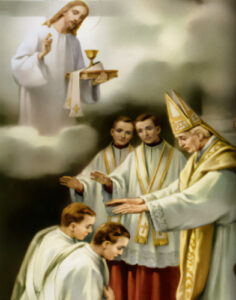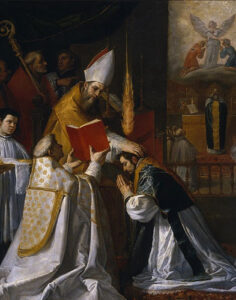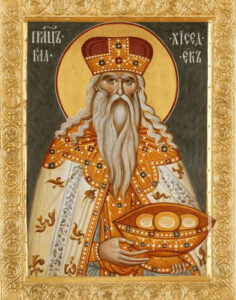Thursday of the Fifth Week of Ordinary Time – Mk 7:24-30
Today’s Gospel recounts the healing of the Syrophoenician woman’s daughter, or, better said, the encounter between the woman and Christ, since the healing is mentioned only at the very end. There are three things that call our attention about the dialogue: first, the woman’s actions when she meets Jesus, second, the label “dog” that Christ applies to the woman and her people, and thirdly, the woman’s reaction to Christ’s words.
Regarding the first, Mark tells us that when the woman came to Jesus, she “fell at His feet.” At this point, she has already won Christ’s heart, since in the Gospels no one who throws themselves at Christ’s feet ever went away empty-handed. We can think of Jairus, the woman who anointed Christ’s feet, among many others. In what follows, then, Jesus is giving her the opportunity to make an even greater act of faith. Rather than simply show His power, He also shows His love and mercy.
Regarding the second, the use of the term “dog,” there are two things to be noted. First, the term “dog” was a common, and rather strong, insult that the Jews commonly applied to the Gentiles. Dogs in that region and time were known to be quite foul, and thus the Jews thought of the Gentiles. However, Jesus greatly softens it by using the diminutive form, kunarion, which means little dogs, or, more properly, little pet dogs.
Thirdly, the woman’s response to Christ is very nuanced. First, there’s an affirmative particle that’s not included in the English translation: her response could be rendered “Yes, indeed, Lord,” meaning she fully accepts that designation and all the humility and lowliness it implies. As one Christian writer explains it, it is as if the woman says, “I know, Lord, that the Gentile people are dogs in worshipping idols and barking at God. Yet even the little dogs eat the crumbs. In other words, you came to the Jews and manifested yourself to them, and they didn’t want you to make exceptions. What they rejected, give to us who are asking for it. . . . Faith accepts what work does not merit, and through faith the Gentiles were made children out of dogs.” Secondly, she replies with two diminutives of her own: the pets await the littlest crumbs from the littlest children, implying that the children, because they love the animals, give them little bits, and the pets sit under the table waiting for it. No, the food the pets receive isn’t intended for them, at least not at first, but because of their patience, they are rewarded. To such a bold statement of faith, Christ replies by healing the sick daughter.
There are two practical points we can take away from this. First, we are reminded of how we should approach God, namely, with humility and faith. Saint John Chrysostom points out that Jesus calls the Jews children, but the woman goes even further, and calls them “masters.” He uses the word “dog” to describe her and her people, but she condescends to apply to herself the action of a dog, sitting under the table. She becomes a child because she lowers herself. The degree to which we will be exalted is the degree to which we lower ourselves, and this is particularly true of priests. As one founder remarked, “You will be good fathers in the measure that you are good sons.” We can ask ourselves if we really accept our limitations and failings in humility, all of which make us little better than dogs in God’s sight. An important element is, too, the woman’s faith. Christ’s delay in replying was her opportunity to show an even greater faith. “The Lord does not delay his promise,” writes Saint Peter, “as some regard ‘delay,’ but he is patient with you, not wishing that any should perish but that all should come to repentance.” We must always grow in our trust in God. We can ask ourselves: do we “fall at His feet” for all of our needs, knowing that He can provide for us, and will do so, even if He seems to delay?
Secondly, we’re reminded of God’s love for us, especially in letting us be called “children of God.” The Eucharistic hymn “Ecce panis angelorum” begins with the lines: “Ecce panis Angelorum, Factus cibus viatorum, Vere panis filiorum, Non mittendus canibus!” “Behold, the bread of Angels become the bread of wayfarers. The true bread of the children, not to be thrown to dogs!” This great gift is for us as God’s beloved children, and the dignity that we have as such. Do we respect that dignity, and do we appreciate it for the great gift that it is?
Let us ask for the grace, through the intercession of Mary, Mother of the Eucharist, to approach God with hearts confident in His love for us, knowing that, as His beloved children, He desires to provide for our needs and to bring us to heaven with Him for all eternity.







